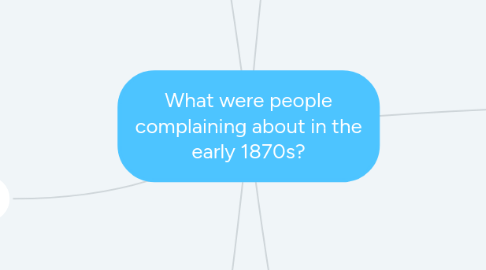
1. Rural Poverty
1.1. Poor Harvests
1.1.1. 1770-1789 Only had three good harvests
1.1.2. Variability of wine crops hit peasants hard - low yields and over supply
1.1.3. failure of fodder crops used to feed animals
1.1.3.1. led to the sale and slaughter of livestock at low prices which put farmers more into poverty
1.2. Small landholdings
1.2.1. only concetrated on enough food for their family
1.2.1.1. couldn't develop better agricultural practices such as new crops and new crop rotations
1.2.1.2. if they rented, they had to give up half their crops to landlords in exchange for seed and tools
1.2.2. france having a backwards system compared to the rest of europe
1.2.3. land was distributed equally to heirs
1.3. agricultural industry
1.3.1. spinning and weaving were depended on as supplementary income for peasants
1.3.1.1. peasants were the purchasers and the producers, but because of the poor harvests they couldn't afford it
1.3.1.2. reduced work available to spinners and weavers
1.3.2. Towns like Amiens and Troyes were nothing without the industry's and were simply hubs
2. Life in the towns
2.1. majority poor
2.1.1. tensions were easily angered
2.1.2. rich
2.1.2.1. nobles and bourgousie
2.1.2.2. few manufacturers
2.1.2.3. skilled craftsmen
2.2. Growth of the towns
2.2.1. Rapid growth
2.2.1.1. created tension
2.2.1.2. fewer living spaces
2.2.1.3. overcrowding
2.2.2. Silk
2.2.2.1. dramatic and frequent rises in price of grain or bread
2.2.2.1.1. triggered unrest and public disorder
2.2.2.1.2. belief in french society that bread price should be low enough for people to afford it
2.2.2.1.3. when prices rose, people threatened bakers and broke into shops and warehouses to auction off bread at fair prices
2.2.2.1.4. intimidated local magistrates into fixing prices at a reasonable level
2.2.2.2. Lyons
2.2.2.3. Nimes
2.2.3. Atlantic Ports Bordeaux and Nantes
2.2.3.1. coffee
2.2.3.2. cotton
2.2.3.3. sugar
2.3. bad standard of living
2.3.1. in the poorest areas
2.3.2. poor water supply and sewage systems
2.3.3. spread of disease
2.3.4. high rates of infant mortality and low life expectancy (only 28.5 years in france in the 1780s)
2.3.5. overcrowding and unhealthy tenements
2.4. bread
2.4.1. 3/4 of a peasants diet
3. Nobles rights
3.1. Feudal rights
3.1.1. peasants had to pay taxes to their lord
3.1.1.1. money
3.1.1.2. animals
3.1.1.3. working on the lords land
3.1.2. gave lords control over manorial courts
3.1.2.1. exclusive rights to hunting and fishing
3.1.2.2. made them able to deny access to food for the peasants
3.1.3. buisness monopoly which they could charge others to use
3.1.3.1. operating mills
3.1.3.2. ovens
3.1.3.3. winepresses
3.2. Control over heavy industry and trading by investment or ownership
3.2.1. mining and metal working
3.2.1.1. investements
3.2.1.2. direct ownership
3.2.2. technically nobles couldn't trade until 1765
3.2.3. sugar plantations in the west indies
3.2.4. textiles
3.2.5. arnaments
4. The tax system
4.1. unfair tax divide between estates
4.1.1. the third estate paid taxes
4.1.2. nobles paid some
4.1.3. clergy was exempt from taxes
4.2. The church
4.2.1. resisted royal attempts to take away their tax exemptions
4.2.2. made a voluntary grant of 16 million livres to the king which only represented 5% of total church income
4.2.2.1. was a better deal than paying taxes
5. Corruption
5.1. Venality
5.1.1. french monarchy brought in money with it - around 4 million livres a year giving it more supporters
5.1.2. 70 000 offices to be bought
5.1.3. heredity property
5.1.4. Resentment
5.1.4.1. blocked advancement of those with talent
5.1.4.2. wealthier bourgeoisie bought and inflated prices
5.1.4.3. price was out of reach for professional bourgeoisie like lawyers
5.2. Complaints on how the church was run and nobilities control
5.2.1. Cures (parish priests)
5.2.1.1. poor, lived on less than 1000 livres a year
5.2.1.2. were paid a fixed amount of the tithe yield
5.2.1.3. paid by bishops and abbots
5.2.2. Higher clergy (archbishops, bishops, and abbots)
5.2.2.1. paid the cure
5.2.2.2. income of more than 100 000 livres per year
5.2.2.3. desirable positions given by the king
5.2.2.4. quarter of the bishops came from just 13 families
5.2.2.5. some bishops were more interested in pursuing political power
5.2.2.6. 1787 - all but one of the 135 bishops were of noble birth
5.2.3. Jansenists
5.2.3.1. Catholics who believed the Pope and their bishops had too much power
5.2.3.2. persecuted by the Archbishop of paris denied them sacraments (baptism and holy communion)
5.2.3.3. many were members of parliment
5.2.3.4. criticized the church hieracrchy
5.2.3.5. opposed the monarchy
5.2.3.6. thought people should have more power rather than being ruled by a monarch
6. New Ideas - Enlightenment
6.1. Philosophes in general
6.1.1. The encyclopedia
6.1.2. used rational thought and logic
6.1.3. explored different notions
6.1.3.1. liberty
6.1.3.2. freedom
6.1.3.3. equality
6.1.4. strong influence in France
6.2. 3 Most influential philosophes
6.2.1. dislike of organized religion
6.2.2. discussed change of social and political institutions
6.2.3. didn't advocate revolution (for the most part)
6.3. Montesques
6.3.1. criticized royal absolutism and despotism
6.3.2. argued role of aristocracy to limit royal power instead of ordinary people
6.3.3. member of parlement
6.4. thought the church should be more concillar instead of being ruled by bishops and archbishops
6.5. Voltaire
6.5.1. His book Candide was banned for mockery of religion and blasphemy and had him thrown in the Bastille
6.5.2. believed religion was necessary to preserve public morals
6.5.3. defended royal authority
6.5.4. criticized the catholic church and religious intolerance
6.6. Rousseau
6.6.1. Went further than the others
6.6.2. suggested a despotic monarch could be overthrown by its subjects
6.6.3. advanced the idea that sovereignty resided in the people rather than the person of the king
6.6.4. talked about benefits of the collective will in the social contract
6.7. America
6.7.1. Louis XVI entered France into the American Independance War
6.7.1.1. The french had sympathy to their pursuit for freedom and democracy
6.7.2. Lafayette
6.7.2.1. was one of the aristocrats that enlisted in american forces
6.7.2.2. brought back ideas of liberty and democracy
6.7.2.3. idea that an existing political authority could be overthrown and new order put in
